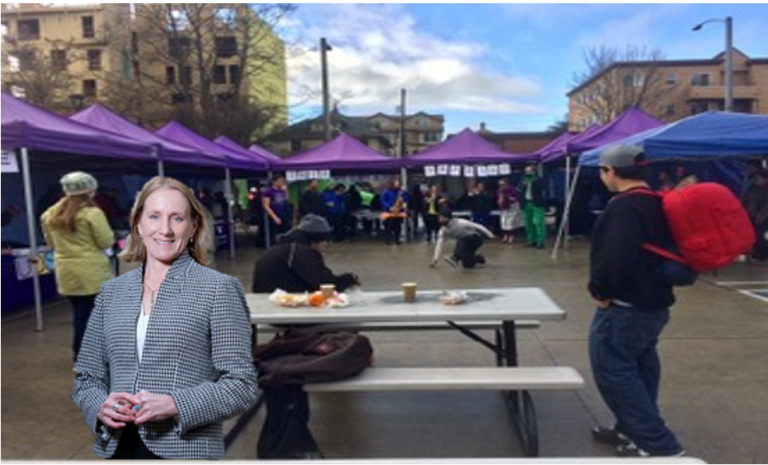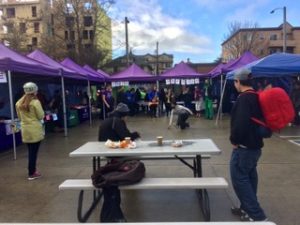Published on March 28, 2018

Josephine Ensign is a Professor in University of Washington’s School of Nursing and Adjunct Professor in the Department of Gender, Women and Sexuality Studies, Affiliate Faculty in UW’s Certificate Program in Public Scholarship, and coordinator of Urban@UW’s Homelessness Research Initiative’s Doorway Project—which is hosting a popup cafe in honor of Earth Day on April 22! We sat down with her to discuss her work and research on homelessness at the UW and beyond.
Tell us about your scholarship and how it relates to urban issues, particularly homelessness.
My terminal degree—they always say terminal cause it kills you—is in public health. My scholarly work is considered public scholarship and my doctorate is in international health, and it’s a practice doctorate because I’m also a nurse practitioner. I always do research that’s outwards focused, in health services, health policy. I’m also really passionate about inter-professional education especially for our health sciences students. I work in a couple of the shelters here in the U-district: Roots young adults shelter, and the Elizabeth Gregory home which is specific to homeless cis and trans women, and functions as a safe house for those dealing with intimate partner violence and trauma. We organize inter-professional groups of medical, nursing, and dental students that do basic foot and dental care and education for them.
In terms of public scholarship, I’m currently wrapping up one project that’s on trauma-informed care called “Soul Stories: Voices from the Margins”, which will be published by the University of California Medical Humanities Press this year. The next one in-line is called Skid road: the intersection of Health and Homelessness,it is an in-depth narrative history of homelessness in King County, looking at how a fairly progressive city/county has historically dealt with the most vulnerable populations, and to figure out how we got to where we are now.
The project that is just starting as part of Urban@UW is the Doorway community café project. We had a faculty retreat in November 2016, and I was a part of brainstorming and planning projects that we could do as a university, looking at our resources, interests, and what we could do that has a higher impact on homelessness, nationally as well as right here on our doorstep. One of the ideas was a place-based studio/ community café. I am working with Lisa Kelly who is a professor in the UW School of Law who assists homeless adolescents and young adults with legal issues, and Charlotte Sanders with the School of Social Work. When I was doing study abroad work in Auckland, New Zealand with Jim Dires, we were with our students working with some agencies and NGO’s building partnerships to address homelessness in a more comprehensive, upstream way than just having soup kitchens. They opened a community café called the Merge café, where baristas and all the food prep people are working their way out of homelessness. The whole point was that they have community tables, there aren’t any single tables. There are unobtrusive social workers and outreach workers that help if people are struggling with housing insecurity or food insecurity. There are homelessness services without being known as “the homelessness café”. And we want to see if that model will work specifically for homeless young adults and adolescents in the U District.
How long have you been working on the challenge of homelessness?
I’ve worked as a nurse practitioner and health services researcher around homelessness since 1984. When I was a young adult I had the lived experience of homelessness for about 6 months. It’s a very individual type of experience that directly impacted my practice and my research. My 1st book is a health policy narrative called “Catching Homelessness: A Nurse’s Story of Falling through the Safety Net” came out in August 2016 and it was the UW Health Sciences common book for AY 2016-17. Homelessness and trauma also affected my teaching; I would always include some of that perspective. But, I wasn’t as “out,” with it because it was—and still is—very stigmatizing and people automatically go to the individual choices that you made. So, that’s changed how I teach and also how I interact with students—in a good way.
What role do community partnerships play in your work?
Public health is by definition inter-professional, so I automatically value partnerships as they allow us to avoid the problem of tunnel vision. For something that’s a wicked problem like homelessness, you have to have inter-professional views, and I love it because it keeps me on my toes. We have many partnerships with homeless youth-serving agencies that operate with businesses, and with policymakers.

How will you use data in addressing homelessness through the Doorway Project?
My philosophy about research follows a pragmatic framework of exploring the best methods, questions, and approaches to figuring out possible solutions to societal problems. My research has always been mixed method so I do a lot that’s qualitative as well as quantitative. For my dissertation I used objective medical charts and physical exam findings as well as qualitative methods like participatory community mapping. I personally think it’s a really important way to go for wicked problems like homelessness—wicked being very multifaceted and so there is no one easy solution. For Doorway we are planning on having broad-based objective data as well as qualitative data.
What approaches do you believe are most effective for addressing homelessness in Seattle?
A community café! Since the “white persons founding of Seattle” we’ve had one of the highest amounts of homelessness per capita, from a continual boom-bust economy going all the way back to when the area attracted a lot of single men mostly for shipping and logging. Looking historically at policy solutions, I’m pragmatic and at the same time very empathetic to people who are experiencing homelessness. I have had the lived experience and I’ve worked with many people who are experiencing that, and at the same time I am a citizen and a homeowner and I have children, and I believe there are certain civil standards we need to have as a society. Coming from a nursing and public health perspective, huge homeless encampments are problematic, and they are symptomatic of something that is significantly wrong with how we are handling housing and social support. If somebody is substance abusing, has severe depression or other mental health issues and you get them a stable place to live, even if you don’t get them counseling and medications, a lot of the time they get better. We need a lot more supportive, longer-term housing, especially for young adults. I’m a mom of two young adults and they had lots of stability and resources, and a lot of the young people right out by the window here have not had those resources, they’ve gone through foster care, detention in the past, fractured lives, and trauma.
What do you see for the future of research and policy-making in your field, and in homelessness as an urban challenge?
More consumer involvement. I work with the National Health Care for the Homeless Council, and they focus on grassroots community involvement. Everything that they do includes consumers to vet certain changes. So, I think of having that as more of a model. Also, respecting people’s time: I’m paid to go to meetings because I’m a faculty member but someone who is struggling to make ends meet, a meeting is taking time away from what they could do otherwise to make money. So, paying them for their time and valuing their input—I think we could do that even more.
If you could give aspiring urban scholars a piece of advice, what would it be?
Get out there—and wear comfortable shoes! It’s one thing to sit in some little office pod or library being very removed. If you’re talking urban scholarship, community involvement is very important, in whatever way you are able to, get out there and take time to be a part of the community that you’re studying or living in.
Thank you!
Written by Shahd Al Baz, Urban@UW Communications Assistant